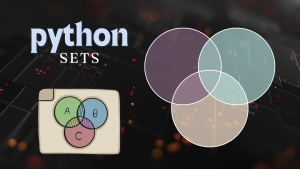The intersection_update() method in Python is a powerful tool for modifying sets based on the elements they share. This method efficiently updates a set in-place, replacing its contents with the intersection of itself and another iterable. Let's explore the details and practical uses of this function.
Understanding the Basics
At its core, intersection_update() finds the common elements between the original set and the iterable you provide. It then modifies the original set to contain only those shared elements. Let's break down the syntax and how it works:
Syntax
set.intersection_update(*other_iterables)
- set: The original set you want to modify.
- other_iterables: One or more iterables (e.g., lists, tuples, other sets).
Explanation
- The method directly modifies the original set (in-place). It doesn't return a new set.
- You can provide multiple iterables as arguments. The intersection will be calculated across all of them.
- If any of the
other_iterablesare empty, the original set becomes empty. - If no
other_iterablesare provided, the set becomes empty.
Practical Use Cases and Code Examples
Example 1: Finding Common Elements
# Initializing two sets
set1 = {1, 2, 3, 4, 5}
set2 = {3, 4, 5, 6, 7}
# Using intersection_update()
set1.intersection_update(set2)
# Output: set1 is now {3, 4, 5}
print(set1)
Example 2: Intersection with Multiple Iterables
# Initializing sets and a list
set1 = {1, 2, 3, 4}
set2 = {3, 4, 5, 6}
list1 = [3, 4, 7, 8]
# Using intersection_update() with multiple iterables
set1.intersection_update(set2, list1)
# Output: set1 is now {3, 4}
print(set1)
Example 3: Empty Intersection
# Initializing two sets
set1 = {1, 2, 3}
set2 = {4, 5, 6}
# Using intersection_update() with no common elements
set1.intersection_update(set2)
# Output: set1 is now an empty set: set()
print(set1)
Potential Pitfalls and Common Mistakes
- Understanding In-Place Modification: Remember that
intersection_update()directly alters the original set. If you need to preserve the original set, use theintersection()method to create a new set with the intersection. - Type Mismatch: Be cautious with the types of iterables you pass as arguments. Ensure they are valid iterables that can be compared for common elements.
Performance Considerations
intersection_update() is an efficient method for finding and updating the common elements of a set. It utilizes the underlying hash-based structure of sets, leading to fast lookups and intersection calculations.
Summary
The intersection_update() method is a powerful tool for efficiently updating a set with the common elements it shares with other iterables. It's a valuable addition to your Python toolkit when you need to manipulate sets and extract shared elements in a concise and performant manner.

